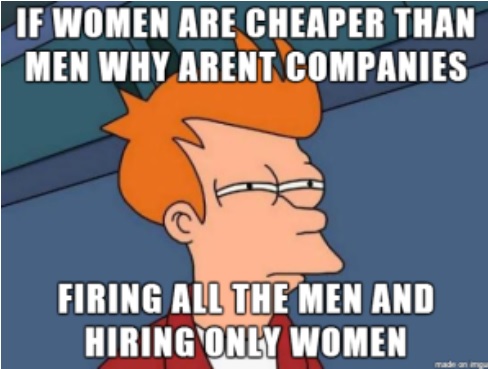I’ve written several times about the issue of the gender pay gap, mostly to point out that our friends on the left are wrong when they assert that there is pervasive and significant sex discrimination in wage levels.
When debating this issue, the first thing I ask people is whether businesses want to maximize profits.
Most people say yes, especially folks on the left (albeit with disapproval).
I then ask the key question: Why would profit-maximizing companies deliberately sacrifice money by paying men above-market wages when they could hire women to do the same work for less money?
That usually leads to a lot of hemming and hawing.
With this in mind, let’s consider Professor Claudia Goldin, who was just awarded the Nobel Prize for her economic analysis of this issue.
David Henderson of Stanford University’s Hoover Institution analyzed Professor Goldin’s work in a piece for the Wall Street Journal.
The prize is well deserved. Ms. Goldin, who earned her doctorate in economics at the University of Chicago in 1972… One of Ms. Goldin’s contributions was to show that women moved out of the labor force in the 19th century. She did this by uncovering underreported data on women’s work. …What accounts for the…wage gap? Many labor economists point to the choice of occupation, which reflects the choice of college major. A 2008 study cited by the Nobel committee found that for women who had a labor-force attachment like that of men, the choice of college major accounted for more than half of the gender earnings gap: Women are substantially underrepresented in STEM fields. …Ms. Goldin, Mr. Katz and Marianne Bertrand of the University of Chicago made that comparison in a 2010 study, which found that the primary factor behind long-term differences in earning was child-rearing. …In a 2010 study, Ms. Goldin and Mr. Katz pointed out that women often receive a wage penalty for demanding a job that’s flexible enough for the woman to be the “on-call” parent. Men are more apt to receive a wage premium for being willing to be the “on-call” employee.
In other words, research shows that differences in wages are a function of market choices.
Catherine Rampell of the Washington Post also opined about Professor Goldin’s work. Here’s some of what she wrote.
Harvard economist Claudia Goldin…achievement is a milestone primarily because of why she won: for providing “the first comprehensive account of women’s earnings and labour market participation through the centuries.” …a pattern evident in data today: Within any given occupation, the gender pay gap is relatively small when people enter the labor force. It widens only later, usually after a woman has a child. This is true despite women’s tremendous gains in education, legislative victories and increasingly diverse career choices, and despite more progressive thinking taking hold about gender roles. Goldin argues that the persistence of the gender wage gap is in part because of the rise of “greedy work,” or the idea that employees who are willing to work longer hours get rewarded so much more — disproportionally more than the extra time put in. She has found that doubling the hours worked typically results in much more than double the earnings; inversely, halving the hours typically results in much less than half the earnings.
I can understand why some people think it would be nice if men and women made the same choices.
But they don’t, which then raises the question of whether government should intervene with dirigiste proposals such as the so-called Paycheck Fairness Act.
My answer is obvious, but I think the most-revealing answer came from one of Obama’s top economic advisers.




